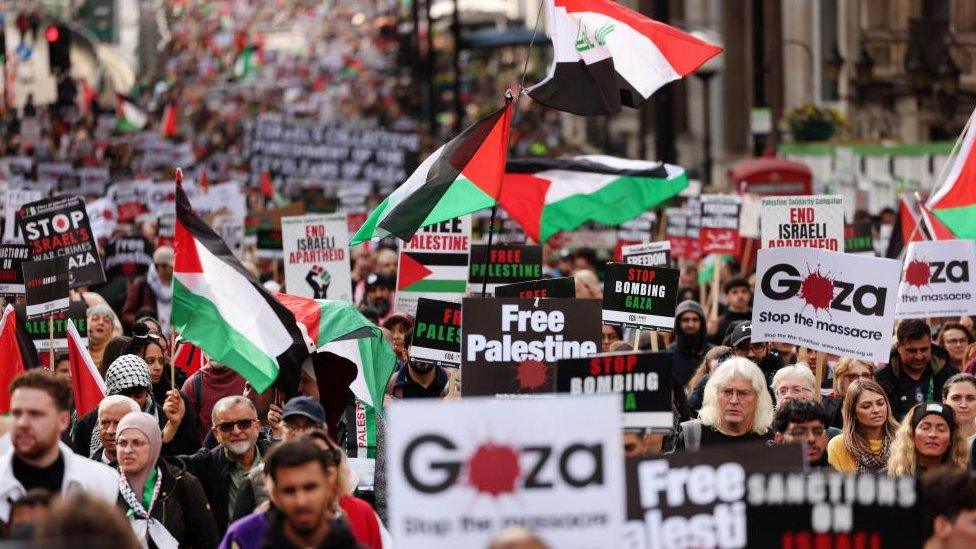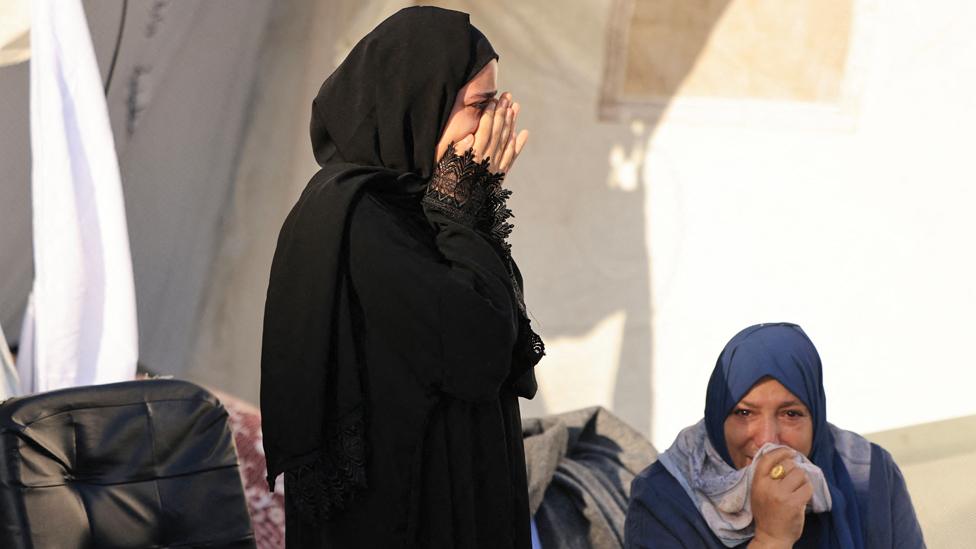Met Police urges pro-Palestinian march organisers to delay demo
- Published

The Metropolitan Police has urged the organisers of pro-Palestinian demonstrations to postpone events due to take place on Armistice weekend.
Thousands are expected to take part in a march in London on 11 November, the same day some Remembrance events are planned in the capital.
Home Secretary Suella Braverman welcomed the Met's statement, which warned of potential disorder.
Organisers criticised the force and refused to cancel the march.
The Met warned of a "growing" risk of violence and disorder fuelled by breakaway groups linked to the protests.
Deputy Assistant Commissioner Ade Adelekan said: "This is of concern ahead of a significant and busy weekend in the capital.
"Our message to organisers is clear: Please, we ask you to urgently reconsider. It is not appropriate to hold any protests in London this weekend."
A statement from the Met said it had spoken with organisers on Monday from several groups, and that they had "declined to postpone" any demonstrations - but this account was disputed by organisers.
They said it was "categorically untrue that the police told us that it was not appropriate" to go ahead with the march, adding that they are "deeply concerned" by the statement.
Organisers confirmed they won't postpone the march, and accused the government and "right wing political groups" of putting pressure on the police to intervene.
The route of the pro-Palestinian march on Saturday runs from Hyde Park to the US Embassy in south London. It does not pass through Whitehall.
No large demonstration is planned for Remembrance Sunday.
Organisers have previously pointed out the Saturday march is due to begin almost two hours after the national two minutes' silence of commemoration.
In the statement released on Monday night, signed by six organising groups including the Palestine Solidarity Campaign, they added: "The idea that it is acceptable for Israel to keep bombing and killing Palestinians in Gaza including over 4,000 children, but not for people to protest peacefully against these crimes is grotesque."

More on Israel-Gaza war
Follow live: Latest updates
Analysis: Jeremy Bowen's five new realities after four weeks of war
From Gaza: Stories of those killed in Gaza
History behind the story: The Israel-Palestinian conflict

The Met has so far stopped short of invoking a public order law whereby it can ask the Home Secretary Suella Braverman to ban a demonstration from taking place.
Responding to the Met's statement, Ms Braverman said: "I welcome this statement from the Met Police. The hate marchers need to understand that decent British people have had enough of these displays of thuggish intimidation and extremism."
Prime Minister Rishi Sunak said on Friday: "To plan protests on Armistice Day is provocative and disrespectful, and there is a clear and present risk that the Cenotaph and other war memorials could be desecrated, something that would be an affront to the British public and the values we stand for."
He added that the police had the government's "full support in making robust use of all your powers to protect Remembrance activity", in a letter to Met Commissioner Sir Mark Rowley.
Ms Braverman has previously described pro-Palestinian protests as "hate marches".
Civil liberties group Liberty said police "should not be able to pick and choose what people can speak out about on any given day", adding "shutting down" protests would be a "wildly disproportionate response".
Israeli President Isaac Herzog described the planned march as "atrocious". He told TalkTV: "I call upon all decent human beings to object to the march and ban it, because the symbol of that day is a symbol of victory."
- Published5 November 2023
